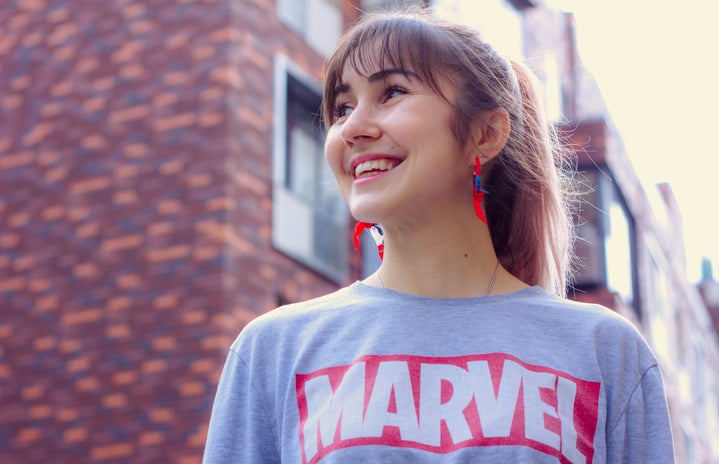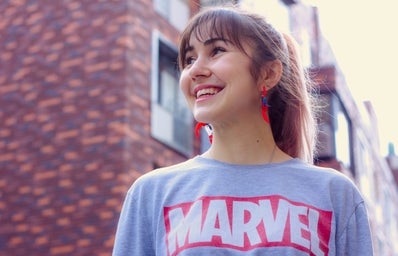It is no debate that the representation of women in media has been lacking, especially in sci-fi and action. Where these two genres overlap is the Marvel Cinematic Universe (or MCU). If you go back and view some of the first few films in the MCU, you’ll notice either a lack of women entirely, or the reduction of women to side characters, sex symbols, or as plot devices to help carry the men who are at the front and center.
In my opinion, the film that embodies this the most is Iron Man 2 and the way it portrayed Black Widow. Natasha Romanoff is gazed upon by Tony Stark, her hair is down and curled, her costume offers no coverage for her chest, and she is only there to assist Iron Man. If I were to engage in fights with armed soldiers, I’d hope my uniform would protect my heart at the expense of showing my chest for the world to see. Not to mention most of her fighting moves involve men’s heads directly in her groin. However, it appears Marvel may have learned from their previous mistakes. With the release of Captain Marvel, WandaVision and Black Widow, more women are being presented at the forefront of these films not as sexual objects, but as strong individuals just as capable of saving the universe as their male counterparts.
Captain Marvel was released in 2019 and is the first film in the MCU to center on a woman, as well as the first MCU film to give directional credit to a woman. The plot surrounds Carol Danvers, portrayed by Brie Larson, who gains superhuman abilities from an alien race and is forced to retrace her life on Earth. As she does this, she begins to understand who she is and the full extent of her power. She encounters people along the way who doubt her abilities and strength, and who go so far as to question whether she can handle the power she has.
While the film has mixed reviews from fans, mainly due to its release date and how the film fits into the MCU as a whole, it was a milestone for the representation of women. First, it passes the Bechdel test: the bare minimum, in my view. Second, Danvers’ costume is full coverage from her neck to feet. She is not dressed to be put on display, rather she is dressed per her job and has actual armor in areas that need protection. Third, and most importantly, it is relatable to women. When I watch Captain Marvel fighting back against the people she has worked with for as long as she can remember because she discovers the truth about what they’re fighting for, it shows courage, strength, passion and power: qualities that have been long reserved for men. This is the kind of representation the MCU has been lacking for more than a decade.

In early 2021, Marvel released WandaVision as a Disney+ original miniseries, and while the first couple of episodes leave many confused, by the last episode the audience watches as Wanda Maximoff transforms into the Scarlet Witch. The miniseries checks the same boxes as Captain Marvel: the Bechdel test, a new and improved uniform, etc. However, it goes much deeper as well. In the final episode, we watch as Wanda’s grief gives her the power to physically transform an entire town, take control of the townspeople’s minds and subconsciously create three new life forms. This was a power that was channeled through her emotions. The takeaway here is that emotions are powerful. If she had bottled up everything inside, it would not have played out the same way. This is rare not just in the MCU, but in the film industry overall. The whole idea that “women are emotional and fragile” is completely turned on its head here, and people all over the gender spectrum gain from this type of representation.
One of the most recent releases from Marvel was Black Widow in July of this year and it is now the second film in the MCU to center around a woman. In fact, three out of the four main characters are women. For those who have yet to see the film, it follows Natasha Romanoff and Yelena Belova as they attempt to take down the Red Room where the two were taken and trained as assassins as children. Black Widow exceeded my expectations when it came to the representation of women. It not only showcased women as strong, developed, intellectual people, but the plot itself revolves around women breaking free from their male captor who spent so much time controlling them. Natasha and Yelena also show their relationships as sisters, protecting and looking out for each other, while simultaneously mocking and poking fun at each other. I hardly ever get to see real sister relationships in the film, and it is so refreshing when it isn’t centered around boys and competing all the time. In my view, this has been the best MCU film in terms of women’s representation.
Now, the best MCU film for women is still far from being the best representation for women in general. For starters, women of color are still not being fully represented and are still reduced to side characters, although overall women are being shown off less across the board. They are putting women’s hair up more as well because why would any woman enter the fight of her life and universe without pulling their hair back? That is why this is an evolution. There is always something that can be done better and seeing as the MCU started so poorly, they still have a long way to go before they can call themselves inclusive.
Want to see more HCFSU? Be sure to like us on Facebook and follow us on Instagram, Twitter, TikTok, YouTube and Pinterest!


